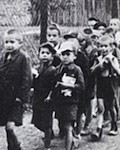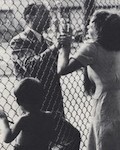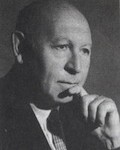Labor Zionist activist Hayim Greenberg (1889-1953) was among the most severe critics of the American Jewish community’s response to news of the Holocaust.
Greenberg grew up in Russia but emigrated after being arrested by the Soviet authorities for his Zionist activity. He arrived in the United States in 1924 and soon become editor of the U.S. Labor Zionists’ two publications, Jewish Frontier and the Yiddisher Kempfer.
Greenberg’s searing essay about American Jews and the Holocaust, “Bankrupt,” appeared in the Yiddisher Kempfer on February 12, 1943. It began by sarcastically proposing “a day of prayer and of fasting” for American Jewry, because of “the vacuity, the hardness, and the dullness that has come over them…a kind of epidemic inability to suffer or to feel compassion” for Europe’s Jews. “If moral bankruptcy deserves pity, and if this pity is seven-fold for one who is not even aware how shocking his bankruptcy is, then no Jewish community in the world today (not even the Jews who are now in the claws of the Nazi devourer) deserves more compassion from Heaven than does American Jewry,” Greenberg wrote.
Greenberg chastised Jewish leaders for permitting religious and political differences, and “tragi-comically inflated prestige considerations,” to interfere with unified action for European Jewry. “Every [Jewish group] cherishes its own committee-interests, its sectarian ambitions, its exclusively wise strategy and its ‘power position’ in the teapot of Jewish communal competition,” he wrote. Greenberg urged them to “set up (temporarily, for the duration of the emergency only) some kind of General Staff that should meet every day and think and consult and consider ways” to promote rescue.
Jewish organizations were wrong to be “satisfied and apparently calmed” by President Franklin D. Roosevelt’s promise to punish Nazi killers after the war, Greenberg wrote. He urged Jewish leaders to demand “that millions of Jews should be saved before the victory.” This appears to have been the first public criticism, in a Jewish publication, of the Roosevelt administration’s position on rescue.
Greenberg was also strongly critical of his fellow-Zionists, some of whom, he wrote, believed the situation was hopeless and therefore wanted to concentrate on pointing to Jewish suffering as proof of the need for a Jewish national home. “A Home for whom?,” Greenberg asked.”For the millions of dead in their temporary cemeteries in Europe?”
Three mainstream Jewish groups were singled out for particular chastisement in Greeenberg’s essay. He cited a meeting of the Jewish Labor Committee at which an escapee from Poland was shouted down as “a hysteric.” He noted that at the recent annual conference of the American Jewish Committee, there was not “even a single word [about] the extermination of the Jews in Europe.” And he charged that “at a time when the Angel of Death uses airplanes, the American Jewish Congress employs an oxcart-express…it has proven to be criminally slow and lacking in tempo and temperament in its rescue work. It displayed a lack of the courage of despair, of that ‘aggressiveness of spirit’ which characterizes the hour of doom…”
“We are all–all five million of us, with all our organizations and committees and leaders–politically and morally bankrupt,” Greenberg concluded. “And I refuse to understand how and why all of us here have fallen to such a state of shameful degradation.”
Appearing only in Yiddish, at a time when the Yiddish-language press was in serious decline, “Bankrupt,” stirred little comment in the Jewish community.
Sources: Medoff and Golinkin, The Student Struggle Against the Holocaust, pp.42-43;
Wyman and Medoff, A Race Against Death, p.32.











